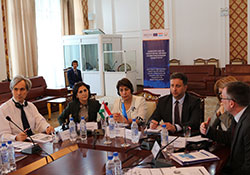Moving towards universal health coverage in Tajikistan: improving access to health services for vulnerable populations

WHO
Over the past decade, Tajikistan has continuously articulated the overarching goal of moving towards universal health coverage (UHC). Specifically, it aims to improve access to health services and to reduce the financial burden associated with seeking health care.
The Government has developed a number of health policies and programmes to achieve these goals. The evidence shows a remarkable decline in catastrophic health-care payments (health payments that exceed 40% of a household’s total non-food expenditures) – from 31% in 2003 to 19% in 2011. In recent years, however, progress has slowed, reaching about 18% in 2015.
A closer look reveals that the decline has occurred among higher-income groups. The poorest 20% of Tajikistan’s population continues to experience large out-of-pocket payments, causing significant financial hardship. A similar pattern is observed in service utilization: half of the poorest people in Tajikistan do not seek care when needed for financial reasons.
In 2016, to improve access to health services and financial protection – particularly for those most in need – Tajikistan joined the European Union–Luxembourg–WHO UHC Partnership. The Partnership aims to advance the work to increase coverage for needed health services by reducing financial hardship and improving equity. These efforts will ultimately lead to UHC in Tajikistan.
On 18 May 2017, the Ministry of Health and Social Protection of Population and WHO jointly convened a round-table meeting in Dushanbe, Tajikistan, to discuss the path ahead. Participants included representatives of the Ministry of Health and Social Protection of Population, the Ministry of Finance, the Ministry of Economic Development and Trade, the State Statistical Agency and other development partners.
Participants presented and discussed the rationale and process for improving the existing benefit package, and key principles for reaching the most vulnerable populations. They agreed that given the country’s limited fiscal space and low public funding, improving the current state-guaranteed benefit package (SGBP) is the best option.
The meeting launched a multistep process involving different stakeholders to improve the design of the SGBP. One of the key steps in this process is to develop a list of prioritized services to be included for a defined group of eligible people, and to name this as a basic benefit package.
WHO provides support to Tajikistan to monitor its progress in achieving UHC, to strengthen the UHC evidence base for more effective, evidence-informed policy dialogue, and to systematically build capacity and strengthen political support for UHC in and beyond the health sector.



